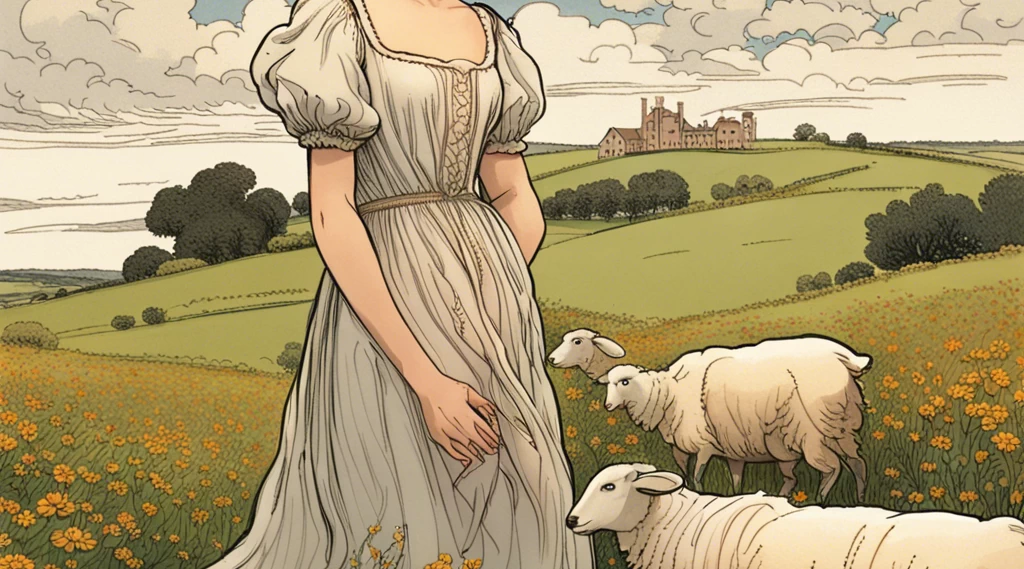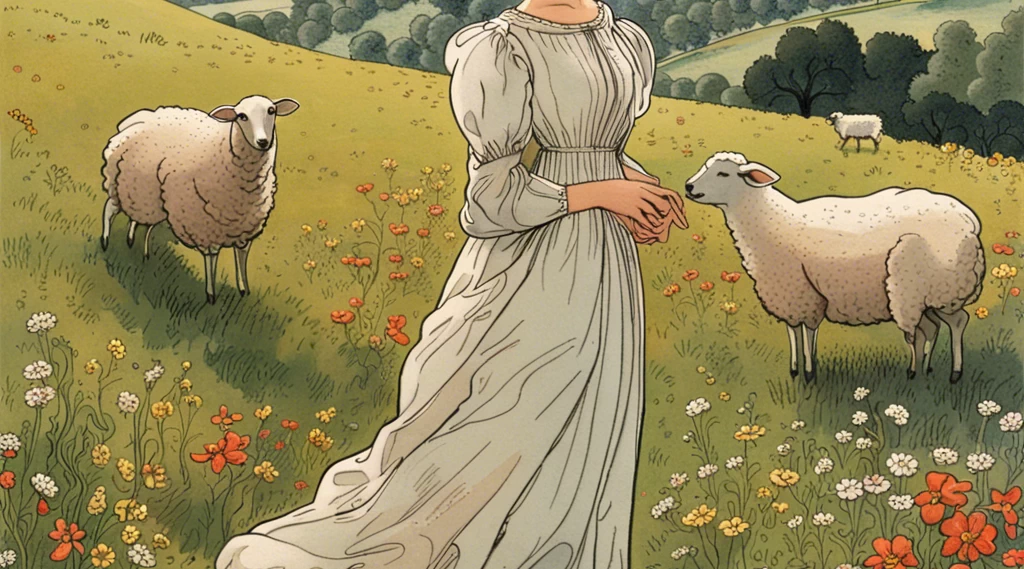Tess of the D'Urbervilles: A Tale of Innocence and Tragedy
"Tess of the D'Urbervilles" is a powerful novel that explores the tragic life of Tess, a young woman from a lower-class background who faces societal prejudices, abuse, and personal struggles in Victorian England.
Chapter 1 What’s the Tess of the D'Urbervilles
"Tess of the D'Urbervilles" is a novel written by Thomas Hardy and published in 1891. The story revolves around Tess, a young woman from a poor family who discovers her supposed noble lineage as a descendant of the ancient D'Urberville family. Tess's life takes a tragic turn as she faces various misfortunes and struggles against the expectations and constraints imposed by society.
The novel deals with themes such as social class, morality, religion, gender roles, and fate. Tess embodies the concept of an innocent and virtuous woman trapped in a society that judges her based on her ancestry and past experiences. Hardy explores the unjust treatment of women in Victorian society and criticizes the rigid social hierarchy.
Throughout the novel, Tess faces numerous challenges and encounters different men who impact her life. One significant character is Angel Clare, a wealthy and educated man who falls in love with Tess. Their relationship becomes central to the story, but it is also fraught with complexities and obstacles.
Hardy's narrative style showcases his vivid descriptions of nature and the rural landscape, giving prominence to the settings in which Tess's story unfolds. The author's use of symbolism and imagery adds depth to the themes explored.
Overall, "Tess of the D'Urbervilles" is a powerful and tragic novel that explores the struggles of its protagonist against the social norms and expectations of Victorian England. It remains a classic work of literature that continues to be studied and appreciated for its portrayal of a woman's journey in a restrictive and judgmental society.
Chapter 2 Why is Tess of the D'Urbervilles Classic
According to reddit comments on Tess of the D'Urbervilles, Tess of the D'Urbervilles, written by Thomas Hardy, is considered a classic novel that is worth reading for several reasons:
- Compelling Storytelling: Tess of the D'Urbervilles presents a captivating narrative that explores the themes of love, fate, social class, and the human condition. It follows the life of Tess, a young woman from a poor family who faces numerous challenges and injustices throughout her journey. The novel's intricate plot and well-developed characters make it a compelling read.
- Deep Characterization: Hardy skillfully crafts complex and multidimensional characters in this novel. Tess herself is portrayed as a deeply sympathetic and relatable character, and her struggles resonate with readers. The secondary characters are also intricately woven into the story, each representing different aspects of society, morality, and personal growth.
- Social Critique: Tess of the D'Urbervilles provides a scathing critique of Victorian society, particularly its rigid social norms, double standards, and hypocrisy. Hardy explores themes such as gender inequality, sexual morality, and the oppressive nature of societal expectations. The novel sheds light on the challenges faced by women in a patriarchal society and raises questions about justice and morality.
- Beautiful Prose: Thomas Hardy's writing style is renowned for its lyrical beauty and descriptive power. His vivid descriptions of the English countryside, combined with his ability to evoke emotions through language, create a rich and immersive reading experience. The poetic quality of the prose adds depth and enhances the overall enjoyment of the novel.
- Timeless Relevance: Despite being set in the late 19th century, Tess of the D'Urbervilles addresses themes and issues that remain relevant today. It explores the effects of societal pressure, individual agency, and the consequences of one's actions, making it a thought-provoking and relatable work even in the present day.
Overall, Tess of the D'Urbervilles is worth reading due to its compelling storytelling, deep characterization, social critique, beautiful prose, and timeless relevance. It offers a powerful examination of human nature and society, leaving readers with lasting impressions and important insights.
Chapter 3 Summary for Tess of the D'Urbervilles
In Thomas Hardy's classic novel, "Tess of the D'Urbervilles," we are introduced to Tess, a young girl living in rural England. Raised in impoverished circumstances, Tess's life takes an unexpected turn when her family discovers their noble lineage as descendants of the prestigious D'Urberville family. As she navigates her newfound status and grapples with societal expectations, Tess experiences love, betrayal, and heartbreaking tragedy that ultimately shapes her into a strong and resilient woman. This captivating tale explores themes of social class, morality, and the struggle for independence, leaving readers both moved and reflective.
Chapter 4 Tess of the D'Urbervilles Author
Thomas Hardy (1840-1928) was an English novelist and poet, known for his realistic portrayals of rural life in Victorian England. He was born in Dorset, England, and spent most of his life in the same region, which greatly influenced his writing.
Hardy's novels often depict the struggles and tragedies faced by ordinary people in small rural communities. His works explore themes such as love, fate, social class, and the changing landscape of England. Some of his most well-known novels include "Tess of the d'Urbervilles," "Far from the Madding Crowd," and "The Mayor of Casterbridge."
Aside from his novels, Hardy was also a skilled poet. His poetry reflects similar themes to his prose, with a focus on nature, loss, and the human condition. One of his best-known collections of verse is "Poems of 1912-13," where he explores themes of mortality and the impact of World War I on society.
Throughout his career, Hardy faced criticism and controversy due to his frank depiction of sexuality and his challenging of Victorian moral values. However, his work has since been recognized for its literary merit and its ability to capture the essence of rural England during this time period.
Today, Thomas Hardy is widely regarded as one of the greatest English novelists and poets of the late 19th and early 20th centuries. His work continues to be studied and appreciated for its insightful exploration of human emotions and societal issues.
Chapter 5 Tess of D'Urbervilles Key Characters
Tess of D'Urbervilles, written by Thomas Hardy, features several significant characters. Here are some of the key characters in the novel:
- Tess Durbeyfield: The protagonist and the title character of the novel. Tess is a young woman from a poor background who discovers she is a descendant of the prestigious D'Urberville family. She is depicted as innocent and pure but faces numerous hardships and tragedies throughout the story.
- Angel Clare: A young man who falls in love with Tess upon meeting her. Angel is from a higher social class and holds progressive views. He desires a relationship based on spiritual connection rather than physical attraction. However, his own flaws and ideals create challenges in their relationship.
- Alec d'Urberville: The antagonist of the story, Alec is the son of a wealthy family claiming to be descendants of the noble D'Urberville line. He seduces Tess and becomes the catalyst for many of the conflicts and misfortunes she faces.
- John Durbeyfield: Tess's father, known as "Sir John," is a simple-minded man who discovers their family's connection to the D'Urbervilles. He indulges in his newfound status, which ultimately leads to Tess's ill-fated encounters with Alec.
- Joan Durbeyfield: Tess's mother, often referred to as "Mrs. Durbeyfield." She supports her husband's fantasies about their noble ancestry and encourages Tess to take advantage of their newfound connections.
- Mrs. D'Urberville: Alec's mother, she plays a minor role in the novel. Despite her wealthy background, she is depicted as manipulative and cold-hearted.
- Reverend Clare: Angel's father, a parson with strict religious beliefs. He has a significant influence on Angel's moral values, which shape his actions throughout the novel.
- Retty Priddle, Marian, and Izz Huett: Three milkmaids who become Tess's friends while working at Talbothays Dairy. They provide support to Tess during her stay there and represent different aspects of rural life.
These are just a few of the essential characters in Tess of D'Urbervilles. The novel explores their interactions and the consequences of their choices within the context of Victorian society.
Chapter 6 Tess of the D'Urbervilles Meaning & Theme
1. Tess of D'Urbervilles Meaning
The meaning of the novel can be interpreted in several ways, depending on one's perspective.
One interpretation is that the novel critiques the rigid social and moral standards of Victorian society. Tess, the protagonist, is born into a lower-class family but discovers she has a noble lineage. However, instead of being celebrated, her heritage becomes a burden that leads to her downfall. This highlights the hypocrisy and injustice of a society that judges individuals based on their ancestry rather than their inherent worth.
Another interpretation suggests that "Tess of the D'Urbervilles" examines the consequences of sexual double standards and the objectification of women. Tess experiences multiple instances of exploitation and victimization at the hands of men who view her as a mere object of desire. Through Tess's tragic story, Hardy challenges societal expectations of purity and chastity imposed upon women while exploring the damaging effects of such attitudes.
Furthermore, the novel delves into the concept of fate or determinism. Tess often feels trapped by circumstances beyond her control, seemingly destined for misfortune. Hardy presents a bleak view of human existence, where individuals are subject to an indifferent universe that seems to conspire against them.
Ultimately, the meaning of "Tess of the D'Urbervilles" lies in its exploration of complex social issues and its examination of the human condition. It sheds light on the struggles faced by individuals who find themselves confined by societal expectations, gender norms, and the constraints of fate.
2. Tess of D'Urbervilles Theme
Thomas Hardy's novel explores the tragic story of Tess, a young woman from a poor rural family who is manipulated and exploited by those in higher social positions.
- Social Class: The novel portrays the rigid social hierarchy of Victorian England. Tess, born into a lower-class family, encounters constant discrimination and judgment from individuals of higher social status. Her connection to the noble D'Urberville family, though ultimately false, exposes the unfairness and limitations imposed by social class.
- Fate and Determinism: Hardy emphasizes the role of fate in Tess's life. Despite her efforts to escape her unfortunate circumstances, Tess seems destined to suffer due to external forces beyond her control. The recurring motif of chance events suggests that Tess's tragic outcomes are predetermined, highlighting the powerlessness of individuals against an indifferent universe.
- Gender Inequality: Tess's experiences illustrate the pervasive gender inequalities prevalent in Victorian society. She faces sexual harassment, objectification, and double standards throughout the narrative. The novel critiques the unequal treatment of women, shedding light on the societal constraints imposed upon them and the resulting detrimental effects on their lives.
- Morality and Hypocrisy: "Tess of the D'Urbervilles" explores the hypocrisy of moral standards within society. Tess is condemned for her supposed immorality while those who exploit her face few consequences. This critique challenges societal notions of virtue and exposes the injustice of holding women to stricter moral standards than men.
- Nature and the Environment: Hardy frequently employs vivid descriptions of nature to reflect Tess's emotional state and predicament. The natural world serves as a contrast to the societal constraints and injustices she faces. It also highlights the harmonious and unforgiving aspects of nature, paralleling Tess's experiences of both beauty and hardship.
These themes collectively contribute to the tragic nature of Tess's story, provoking reflection on societal norms, gender dynamics, and the impact of circumstances outside individuals' control.
Chapter 7 Digital Content about Tess of the D'Urbervilles
If you're on the hunt for "Tess of the D'Urbervilles" presented in various formats along with concise summaries, we suggest checking out platforms like Bookey. They offer an extensive collection of books in diverse formats and provide short summaries that give you a quick glimpse into each book's content. This is particularly advantageous if you seek a comprehensive overview without investing excessive time. For a more visual approach to exploring the book, we highly recommend visiting YouTube where you can discover a wealth of video material on Tess of the D'Urbervilles. Additionally, you'll find peripheral presentations related to the book, such as Tess of the D'Urbervilles by Thomas Hardy, which delve deeper into its subject matter and provide informative content. However, we regret that we cannot directly offer a PDF version of Tess of the D'Urbervilles. Our main goal through this post is to introduce the value of the book and provide alternative reading options. Happy reading!
Chapter 8 Quotes of Tess of the D'Urbervilles
Tess of the D'Urbervilles quotes as follow:
- "Did it never strike your mind that what every woman says, some women may feel?" - Tess Durbeyfield
- "Why didn't you tell me there was danger in men-folk? Why didn't you warn me?" - Tess Durbeyfield
- "Justice was done, and the President of the Immortals had ended his sport with Tess." - Thomas Hardy
- "It is too hard for me—that's what it is—to be told you love me, and yet not really to have you love me!" - Tess Durbeyfield
- "I would be content if we could go on like this forever, and I could be always as I am now." - Tess Durbeyfield
- "I am more humble to the dust than any beggar in the parish." - Tess Durbeyfield
- "I'm not worth doing wrong for." - Tess Durbeyfield
These quotes capture some of the emotional depth and personal struggles experienced by the main character, Tess Durbeyfield, throughout the novel.
Chapter 9 Chapters about Tess of the D'Urbervilles
"Tess of the D'Urbervilles" tells the tragic story of Tess Durbeyfield, a young woman from a poor family in rural England. The novel explores themes of fate, social class, and the role of women in Victorian society. The length of the novel varies depending on the edition and formatting but typically ranges from 400 to 500 pages.
The book consists of three main parts: "The Maiden," "Maiden No More," and "The Convert."
In the first part, Tess's impoverished family learns that they are descendants of the noble D'Urberville family. Hoping to improve their fortunes, they send Tess to claim kinship with the wealthy Alec D'Urberville, who seduces her and takes advantage of her innocence.
In the second part, Tess returns home as a fallen woman after giving birth to a child who dies shortly after. She finds work on a dairy farm called Talbothays, where she meets and falls in love with Angel Clare, a compassionate and educated man. However, Tess feels unworthy of his love due to her past and keeps her secret from him.
The third part begins with Tess and Angel getting married, but when Tess finally confesses her past to him, he reacts with shock and disappointment. Angel leaves for Brazil, hoping to start a new life, while Tess finds herself abandoned and destitute once again.
The novel continues with Tess's struggles and her eventual reunion with Alec, who has reformed himself and found religion. Tess reluctantly allows him back into her life, but tragedy strikes when Angel returns from Brazil and confronts Alec, leading to a series of events that culminates in Tess's tragic downfall.
The ending of the book is heartbreaking. Tess, pursued by Alec once more, seeks refuge at Stonehenge. There, she is captured and arrested for killing Alec when she stabs him in self-defense. The novel concludes with Tess being executed for her crime, highlighting the injustices of a society that punishes women for their actions while men like Alec go unpunished.
Chapter 10 Similar Books Like Tess of the D'Urbervilles
If you enjoyed reading "Tess of the D'Urbervilles" by Thomas Hardy, there are several other classic novels that explore similar themes and have a similar narrative style. Here are a few recommendations:
- "Jane Eyre" by Charlotte Brontë: This novel follows the life of Jane Eyre, a young woman facing various challenges and moral dilemmas in Victorian England. Like "Tess of the D'Urbervilles," it explores issues of social class, morality, and the position of women in society.
- "Wuthering Heights" by Emily Brontë: Another classic novel from the Victorian era, "Wuthering Heights" delves into themes of love, passion, revenge, and societal constraints. It tells the story of Catherine Earnshaw and Heathcliff, whose intense relationship is marked by tragedy and forbidden desires.
- "Anna Karenina" by Leo Tolstoy: Set in 19th-century Russia, this novel portrays the life of Anna Karenina, a married woman who embarks on an affair with Count Vronsky. Like "Tess of the D'Urbervilles," it explores the consequences of societal expectations, love, and the role of women.
- "Madame Bovary" by Gustave Flaubert: This novel follows the life of Emma Bovary, a young woman trapped in a stifling marriage who seeks escape through romantic fantasies and extramarital affairs. It examines themes of adultery, disillusionment, and the limitations placed on women in society.
- "The Awakening" by Kate Chopin: Taking place in late 19th-century Louisiana, this novel tells the story of Edna Pontellier, a woman who rebels against societal expectations and tries to discover her own identity. It explores themes of female independence, sexuality, and the constraints of marriage.
These books share similarities with "Tess of the D'Urbervilles" in terms of their exploration of societal constraints, complex characters, and themes of love, morality, and women's roles. Enjoy diving into these compelling works!





